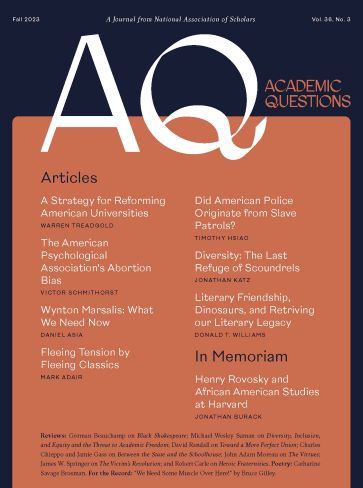Heroic Fraternities: How College Men Can Save Universities and America, Anthony B. Bradley, Wipf and Stock, 2023, pp. 212, $26.79 paperback.
The first American college fraternity began when five students at Union College met in November 1825 to form Kappa Alpha. These five men felt an “aching void” after they left the military, and they committed to gather periodically for literary and social purposes. Throughout the nineteenth century, fraternities flourished as dining clubs, literary societies, and secret initiatory orders. In a time of rapid social, educational, and professional changes, fraternities provided American men with networks, ideas, friends and allies. They also honed members’ skills in recitation and rhetoric. By 1900, there were fraternities on every campus in New England and the mid-Atlantic states. Forty-four percent of all American presidents; 76 percent of current Congressmen; and all but seven of forty-seven Supreme Court justices since 1910 were fraternity brothers.
Fraternities offered to college students a model of family that was comforting to men who were away from home for the first time. Like one’s natal family, fraternal ties were presumed to last a lifetime. The fact that fraternity bonds were lifelong forged trust among members, so that fraternity members held each other accountable for their actions. A fraternity brother was expected to confront a brother who was going astray in an effort to improve his character and preserve the good name of the fraternity.
During the 1960s, fraternities were stigmatized as bastions of racism and elitism. Membership fell sharply. Hundreds of fraternity chapters closed, and houses fell into disrepair. With the release of the film Animal House in 1978, fraternities came roaring back to life. In their new incarnation, fraternities fused the drugs, hedonism, and personal liberation of the 1960s with the self-indulgent materialism of the 1980s. Fraternities became synonymous with the worst pathologies of college life: binge-drinking, sexual assault, and violent hazing. Fraternities became the sites of thousands of incidents of serious injuries, assaults, and sex crimes. Since 2005, more than sixty college students have died in incidents linked to fraternities. This has led to a national movement to abolish Greek life. Anthony Bradley writes that every year, self-serving and self-centered fraternity men “rationalize the vast quantities of booze they buy, the many girls they ‘host,’ the torments of their pledges—and the calls to abolish fraternities only get louder.” (53)
In his new book, Heroic Fraternities, Anthony Bradley, a distinguished research fellow at the Acton institute, argues that the Abolish Greek Life movement squanders an opportunity for colleges to appeal to moral virtue and build a new culture of belonging on college campuses. Bradley spent four years studying fraternities, and, as he records in this book, fraternity leaders respond to invitations to encourage their members to be men of outstanding character. Chad Frick, who served as president of Alpha Sigma Phi at Clemson University, represents the sentiments of many of the fraternity leaders Bradley interviewed for his project: “We are looking for guys who give a damn. What I mean by that is everyone thinks it’s cool to not care. We want guys who care, and we want guys who give a damn about themselves, about us, about school, about the community, about the country, about the world, and we want people who are going to make the world better.” (50) Chad Frick aspires to lead a “heroic” fraternity where men use their power, presence, strengths, and creativity to benefit those around them.
Bradley describes vividly the struggles that American boys are facing in our culture of disconnection. Depression, anxiety, suicidal ideation, loneliness, and poor self-esteem are all normal parts of the high school experience. Suicide is the second leading cause of death for males fifteen to twenty-four years old. Men account for six of ten college-age suicides. “We ought to call young men to heroic masculinity as quickly and thoroughly as we can, and we should see fraternities as a resource in doing this,” Bradley writes.
To become a fraternity man, many current systems reward massive abuse of drugs and alcohol, the ability to sexually conquer at will, and dominance over younger members and nonmembers. Bradley believes that the path to brotherhood can be made virtuous, lifting brothers up so that they can learn to moderate their drinking and exercise self-control and wisdom in romantic relationships.
“We need not reduce the influence of fraternities, we simply—though with difficulty—need to help structure fraternities so that their influence is channeled to positive and heroic ends,” Bradley writes. Key to restructuring fraternities is the role of alumni in the lives of fraternity brothers. Bradley proposes that fraternities deepen their relationships with older alumni as an antidote to the misconduct that routinely happens when adult guidance is missing. “Fraternities would benefit from asking older alumni to serve as ‘old bulls’ for their fraternity. The most disordered fraternities are the ones most lacking mature male guidance,” Bradley writes. (52)
The pledge period, Bradley writes, provides fraternity men with an important opportunity to get older alumni involved with their chapters. “Consider asking alumni to be present at your pledge events. Be direct in what you need: ‘If you think we are going too far, stop us!’ It is a mark of maturity to be humble enough to ask for guidance and accountability.” The older the alumni, the better, Bradley writes, “They will keep fraternity members, new pledges, and women guests—and the brotherhood itself—safe.” (52)
To dramatize how this process could work, Bradley draws an analogy between fraternity brothers and African elephants. In an overpopulated South Africa game park, rangers separated young bulls from their elders, with disastrous results. The relocated elephants grew up into troubled teenagers. They charged tourist vehicles and murdered large numbers of white rhinos. Park rangers had to import adult role models for the wayward young elephants. As an old herd came to congregate with the young elephants, a new hierarchy developed, with the old bulls “sparring with the younger elephants” to keep them in line. This had the welcome side effect of lowering the testosterone levels of the youthful elephants. The murders stopped, as did all the harassment.
When college men are in a fraternity that practices healthy masculinity rather than disordered masculinity, they are better able to regulate their impulses, be less selfish, and respond actively and purposefully to the challenges of life. The acceptance that fraternities provide improves mental health and self-esteem of the men who join them. “Our bodies and brains were made for connection,” Bradley writes. (76) This is why receiving a bid invitation to pledge a fraternity can be such a powerful moment in a man’s life. Men need other men to grow and develop into better men, and guys pledge fraternities because they know that on the other side of the initiation ceremony lies a path to permanently obliterate isolation and create some of the best friends he will ever have. “Outside of sports teams, there is no better organization on college campuses for men to forge these types of friendships than in a fraternity,” Bradley writes. (75)
An important reason that men need close friends is that every man—especially the most successful ones—has an Achilles heel or two that threatens to bring him down. Bradley writes, “Every man needs a friend or two who knows these weaknesses and can help him fight against them. He needs friends who can hold him accountable and help him take responsibility for these weaknesses so they do not consume his life and eventually ruin him.” (77)
Heroic fraternities accept imperfect men, forge deep friendships among men, and then release them into the world to make the world a better place. Heroic fraternities are characterized by their contagious laughter, which makes them the most fun places to be on campus. Heroic fraternities develop men personally, academically, and professionally. “Every college campus needs more heroic fraternities,” Bradley writes, “and it would make sense if every man wanted to join one.” (95)
If universities could believe in the moral potential of fraternity men, they could enlist fraternities in an effort to reverse the soaring rates of substance abuse fueled by anger and despair by providing men with the support, friendships, and role models they need to live fulfilling lives. At the same time, Bradley argues that moral excellence will become an aspiration among college men only when college leaders “invite fraternity men to devote themselves to [lives] of prudence, justice, fortitude, and temperance.” The Abolish Greek Life movement sees fraternities as irredeemable, and this squanders an opportunity to appeal to moral virtue to inspire students to become people of outstanding character.
Bradley presents us with a bold vision of redeemed fraternities that can forge a path to moral renewal on campus. His proposals are certainly worth implementing, but they will face fierce cultural headwinds, not only from the Abolish Greek Life movement, but also from colleges that fail to tutor students in classical and biblical moral languages. If fraternities are going to develop a culture of moral excellence, they will need to do this without the help of college administrators who know how to punish fraternities, but who no longer know how to instruct young men in moral virtue. This is a heavy burden to place on the shoulders of fraternity brothers.
Robert Carle was a professor of theology at The King’s College in Manhattan from 1999 to 2023; [email protected]. Dr. Carle has contributed to the Wall Street Journal, the American Interest, Newsday, Society, Human Rights Review, the Public Discourse, Academic Questions, and Reason. He last appeared in AQ in Spring 2023 with “Bicycles in a Sea of Fish,” a review of Richard V. Reeves’s Of Boys and Men (Brookings Institute Press, 2022).
Photo by Adobe Stock













